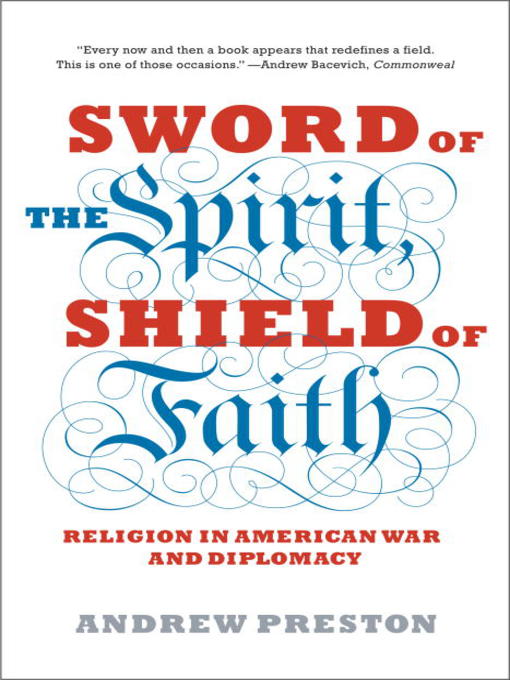
Sword of the Spirit, Shield of Faith
Religion in American War and Diplomacy
فرمت کتاب
ebook
تاریخ انتشار
2012
نویسنده
Barbara Laineنویسنده
Barbara Laineنویسنده
Andrew Prestonشابک
9780307957603
کتاب های مرتبط
- اطلاعات
- نقد و بررسی
- دیدگاه کاربران
نقد و بررسی

Starred review from January 1, 2012
A sharp, clear, deeply researched examination of the consistent application of the founding religious principles to American foreign policy, from the colonists' sense of a Protestant exceptionalism to President Obama's "Good Niebuhr Policy." The invocation of God and religion to sanctify foreign-policy decisions is not a new or surprising idea, as Preston (American and International History/Cambridge Univ.) learned especially when he was researching his work on McGeorge Bundy and the Vietnam War (The War Council, 2006). However, the extent to which religion has been used consistently to shape U.S. diplomatic history proved "an odd and unsettling discovery." Here the author thoroughly documents that discovery, from the self-righteous Puritans' establishing their "City upon a Hill" to the modern-day presidents acting as self-appointed popes. Preston explores this fascinating paradox of a nation founded on freedom of religion yet exhibiting, in its relations with the wider world, a profound belief in a Judeo-Christian sense of "exceptional virtue." America's unique geographical position in the world allowed it "free security" to engender idealistic choices and values, reflected in its moralistic foreign policy. Its founding Reformation Protestant society eventually developed tenets of pluralism, libertarianism, a deep suspicion of despotism and hostility to arbitrary power, a faith-based progressivism, nationalism and even isolationism, all of which Preston explores systematically. America's reaction to what it perceived as corrupt and tyrannical foreign influences thus allowed the republic to model itself as virtuous and in the right, spreading "God's own cause" in subsequent dealings with the Indians, Canadians, Mexicans, Cubans and Filipinos, largely for worse. Preston sifts carefully through the "religious biographies" of certain key policymakers, including John Quincy Adams, William McKinley, Abraham Lincoln, Woodrow Wilson, Franklin Roosevelt, John Foster Dulles and others. A frank, exhaustive, marvelously readable study.
(COPYRIGHT (2012) KIRKUS REVIEWS/NIELSEN BUSINESS MEDIA, INC. ALL RIGHTS RESERVED.)

March 1, 2012
In this extensive study, Preston (American & international relations history, Univ. of Cambridge, UK; The War Council: McGeorge Bundy, the NSC, and Vietnam) moves elegantly from Congregational colonialism's war with the Pequot through post-9/11 involvement in Afghanistan, tracing how American imperatives have been tinged with religious zeal. He cogently manages the breadth of his topic by use of such concepts as "Christian Republicanism," a persistent anti-Catholic strain, and serial U.S. "crusades" that started in Cuba and the Philippines in 1898 and have persisted in interventions ever since. Preston reminds us that while religion is only a single component in America's relationship with the world, it plays a distinct role in that relationship. Historically, religion has helped aggregate the claims of government and the opposition. Preston tells his story through individuals: devout American Presidents, zealous missionaries, and original thinkers such as James R. Mott and Reinhold Niebuhr. While Preston avoids commenting on current political issues, his book is relevant to questions such as the debates between libertarians and social conservatives. He sees the recent surge in Christian fundamentalism and evangelism as rooted in the McCarthy era. VERDICT Such a broadly conceived book not only will provoke controversy but also will appeal to readers beyond students of American history and religion.--Zachary T. Irwin, Pennsylvania State Univ., Erie
Copyright 2012 Library Journal, LLC Used with permission.

Starred review from February 15, 2012
Explaining his confidence in American victory over the Nazis, FDR's vice-president, Henry Wallace, quoted Isaiah before declaring, Strong in the strength of the Lord, we who fight in the people's cause will never stop until that cause is won. Preston situates Wallace in a very long chain of American leaders, from seventeenth-century colonist John Winthrop to twenty-first-century president Barack Obama, intent on applying religious precept to international politics. Readers will probably recognize some episodes in this narrative, the eighteenth-century Great Awakening that helped kindle the colonists' revolt against Great Britain, for example. But Preston's painstaking research not only exposes new details in familiar episodes but also brings into view some entirely unfamiliar episodes. It will, for instance, surprise most readers that George Kennan turned to John Milton's Christian poetry to justify his Cold War strategy of containment. Most readers will likewise be surprised at how decisively seven Pentecostal immigrants affected Reagan's diplomacy with the Soviets. But what is most astonishing is not this or that episode but, rather, the ubiquity of religious influence on America's international relations, a ubiquity that Preston complains has for far too long been hidden by the secularist bias of academic historians. A much-needed corrective to that bias.(Reprinted with permission of Booklist, copyright 2012, American Library Association.)

























دیدگاه کاربران